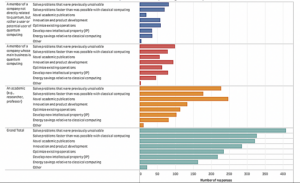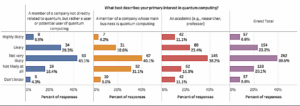(Funtap/Shutterstock)
Rapid advancements in quantum computing are bringing a new era of technological possibilities. However, as quantum technology progresses, there are growing concerns about the availability of resources—a challenge reminiscent of the recent shortage of Graphics Processing Units (GPUs) faced by companies in the AI sector.
The surge in demand for GPUs, driven by the race to develop large language models (LLMs) and other AI solutions, has left many organizations struggling to secure the computational power they need. Companies of all sizes, from tech giants to startups, have found themselves competing for limited GPU resources, leading to project delays, increased costs, and in some cases, a reevaluation of AI strategies. This scarcity has not only affected AI-focused firms but has rippled through other industries seeking to implement AI solutions.
As we move towards the quantum era, there’s a growing concern that a similar scenario could occur in the quantum computing landscape. With quantum technology’s potential to solve previously unsolvable problems, demand for quantum resources could quickly outweigh supply, leaving industries at a significant disadvantage.
In June 2024, QuEra Computing conducted a comprehensive survey on the state of quantum computing. Our survey sheds light on how organizations are strategizing to implement quantum technology and which demographics fear being caught off guard, much like many were in the AI GPU crunch.
Why Are Companies Investing in Quantum?
Organizations are increasingly investing in quantum technology, driven by the potential to solve complex problems that are currently beyond the capabilities of classical computing. According to our survey, the primary motivation for these investments is the exploration of future opportunities and applications. Both end-users and quantum-centric companies are eager to leverage quantum computing to gain a competitive edge and unlock new avenues for innovation.

If you are currently investing in quantum computing capabilities, what is driving your decision? (Source: QuEra Computing Inc.)
However, despite these investments, the return on investment (ROI) is not yet fully realized. Different groups of the surveyed individuals had mixed responses when asked where the highest ROI would be seen from quantum sources. Quantum computing is still in its early stages, and while companies and individuals are betting on its future potential, they are unclear how it will generate returns. End-users and manufacturers believe the highest ROI increase will come from previously unsolvable problems being solved by quantum computing, while researchers believe it will most greatly impact ROI through academic publications.

What do you expect to be the source(s) of quantum computing ROI in your organization? (Source: QuEra Computing Inc.)
Will Your Organization Be Caught Off-Gguard?
A significant concern among organizations is the fear of being unprepared for the rapid pace of quantum developments. The survey reveals that 31.8% of respondents are worried that their organizations might be caught off guard by the speed at which quantum technology evolves. This concern is particularly pronounced among end-users and academic institutions, who may lack the resources to keep up with the technological curve, potentially leaving them vulnerable to more agile competitors.

Detail by organization: How likely is it that your organization will be caught off-guard by the pace of development and availabilityi of quantum computing? (Source: QeEra Computing Inc.)
A Strategic Approach to Quantum Deployment
In response to these concerns, companies are exploring various strategies to ensure they are not left behind. One critical decision is whether to deploy quantum resources on-premises or rely on cloud-based solutions. Despite quantum technology being in the early stages and its accessibility on the cloud, almost 20% of responses planned to have quantum computers on-premise. This shows the strategic importance that these companies place on being able to access computers, safeguard their data, and tightly integrate it with classical computers.
By maintaining on-premises capabilities, companies can ensure access to quantum resources even if cloud availability becomes constrained—a lesson learned from the AI sector’s experience with GPU shortages. Furthermore, organizations are prioritizing investments in talent and skill development to build a workforce capable of leveraging quantum technology, reducing their reliance on external resources.

If you plan to invest in quatum computing, will be via private cloud, or on premise? (Source: QuEra Computing Inc.)
Will Quantum Face the Same Resource Scarcity as AI?
The possibility of a shortage of quantum resources, particularly in the cloud, is a critical concern for many organizations. Our survey reveals that 64.5% of respondents are worried about securing quantum computing time on the cloud once its value is proven. This fear stems from the recent experience in the AI sector, where the demand for GPUs outpaced supply, leading to delays and increased costs for AI projects.
As companies anticipate a similar scenario in the quantum industry, they are carefully considering their resource strategies. While cloud providers offer the promise of vast, scalable resources, the potential for scarcity has led some organizations to consider alternative approaches, including on-premises deployments and strategic partnerships to secure priority access.

Due to the rapid growth of AI applications, many people are expereiencing difficuties in securing time on GPUs for their projecdts. Are you concerned that a similar situation might occur with quantum computers once their value is proven? (Source: QuEra Computing Inc.)
The findings from our survey highlight the critical need for organizations to develop robust strategies for quantum resource management. As quantum technology continues to evolve, companies must be proactive in addressing potential resource constraints and ensuring they are not caught off guard by the rapid pace of advancements. Whether through on-premises deployments, strategic partnerships, or investments in quantum talent, the decisions made today will determine who leads in the quantum era and who gets left behind.
By drawing lessons from the AI sector’s challenges with GPU shortages, organizations can better prepare for the quantum future. The race to quantum supremacy is not just about technological prowess—it is also about foresight, preparation, and the ability to adapt to an ever-changing landscape.
About the author: Yuval Boger is the Chief Commercial Officer at QuEra, a company working to commercialize quantum computing. In his career, Boger has served as CEO and CMO of frontier-tech companies in markets including quantum computing software, wireless power, and virtual reality. His “Superposition Guy’s Podcast” hosts CEOs and other thought leaders in quantum computing, quantum sensing, and quantum communications to discuss business and technical aspects that impact the quantum ecosystem.
company working to commercialize quantum computing. In his career, Boger has served as CEO and CMO of frontier-tech companies in markets including quantum computing software, wireless power, and virtual reality. His “Superposition Guy’s Podcast” hosts CEOs and other thought leaders in quantum computing, quantum sensing, and quantum communications to discuss business and technical aspects that impact the quantum ecosystem.
Related Items:
Quantum Computing and AI: A Leap Forward or a Distant Dream?
Is Quantum Computing the Future of AI?
Machine Learning Cuts Through the Noise of Quantum Computing
Source link
lol

